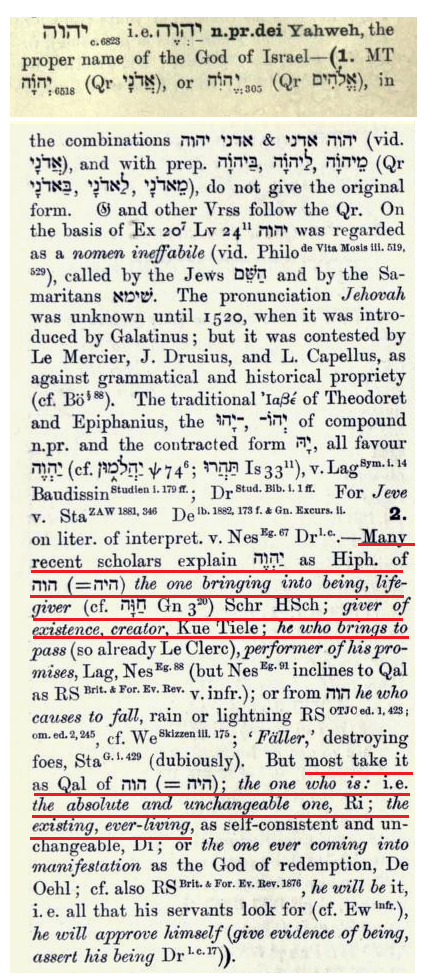Exodus 3:14-15 - Hebrew Transliteration for example here
vayomer elohim el-mosheh, ehyeh asher ehyeh; vayomer, koh tomar livnei yisra'el, ehyeh, shelachani aleichem vayomer od elohim
el-mosheh, koh-tomar el-benei yisra'el, y'hwäh elohei avoteichem
elohei avraham elohei yitzchak velohei ya'akov, shelachani aleichem;
zeh-shemi le'olam, vezeh zichri ledor dor
And God said unto Moses: 'I AM THAT I AM'; and He said: 'Thus shalt
thou say unto the children of Israel: I AM hath sent me unto you.'
And God said moreover unto Moses: 'Thus shalt thou say unto the
children of Israel: The LORD (YHWH), the God of your fathers, the God
of Abraham, the God of Isaac, and the God of Jacob, hath sent me unto
you; this is My name for ever, and this is My memorial unto all
generations.
The combination YHWH (يحوح or يهوه) does not form a valid word or phrase in Arabic (AFAIK) and does not appear in the Quran and Hadith. Similarly the pronunciation Yahweh [apparently disputed?] is again not found in the Quran and Hadith and there are no reports of the Prophet Muhammad (p.b.u.h) using it.
So, in this exact form, its unprecedented to use the name ... it might be one of the divinely revealed names of Allah, or it might be an innovation, or the truth might be somewhere in the middle. Caution would dictate that a Muslim avoid it, as far as I know the Jews themselves have strict rules about uttering it because of its sanctity and instead substitute it with Adoni and Elohim when reciting the Torah.
A point to note here is that words and names in the Hebrew Torah and the Arabic Quran are similar but not always exact replicas in spelling, nor pronounciation. For example Moses is Mosheh (M Sh H) in Hebrew and Musa (M W S A) in Arabic, similarly orphan is Yathowm (Y T W M) in Hebrew and Yateem (Y T Y M) in Arabic and so on.
The etymology of YHWH seems to point to a meaning of God's being and existance, creating life and being eternal.
From A Hebrew and English lexicon of the Old Testament by Brown, Driver and Briggs p 217-218:

This makes it a cognate to the Arabic Ya-Haeeyu ( يَا حَىُّ ), Yuhyee ( يُحيي ) and possibly Hu ( هُوَ ), which are names and attributes of Allah attested to in the Quran and Hadith.
Further there Hadith that Haye حَىُّ is part of the Isme Azam (Greatest Name of Allah), and there are narrations within Islamic tradition that it is the equivalent of ehyeh asher ehyeh:
Tafsir Al Qurtubi on 2:255 narrates:
الحي» اسم من أسمائه الحسنى يسمى به، ويقال: إنه اسم الله تعالى الأعظم.
ويقال: إن عيسى ابن مريم عليه السلام كان إذا أراد أن يحيي الموتى يدعو
بهذا الدعاء: يا حي يا قيوم. ويقال: إن
آصف بن برخيا لما أراد أن يأتي بعرش بلقيس إلى سليمان دعا بقوله يا حي يا
قيوم. ويقال: إن بني إسرائيل سألوا موسى عن اسم الله الأعظم فقال لهم:
أيا هيا شرا هيا، يعني يا حي يا قيوم.
Al Hayee is a name of Allah from His beautiful names with which He is
called. And it is said that it is the Great name of Allah.
And it is said that when Jesus, son of Mary had to resurrect a dead
person he would supplicate with the name Ya Haeeyu Ya Qayoomu.
It is also said that Asif bin Barkhiya brought Solomon the throne of
the Queen of Sheba by supplicating using Ya Haeeyu Ya Qayoomu.
And it is said that when the Children of Israel asked Moses about
Allah's Great name, it was said "ehyeh asher ehyeh" i.e Ya Haeeyu Ya
Qayoomu.
Similarly, when commenting on 27:40, he narrates:
وقالت عائشة رضي الله عنها قال النبي صلى الله عليه وسلم: " إن اسم الله
الأعظم الذي دعا به آصف بن برخيا يا حيّ يا قيوُّم قيل: وهو بلسانهم،
أهيا شراهيا؛
Aisha said: The Prophet (p.b.u.h) said: The Great
Name with which Asif bin Barkiyar made a supplication was "Ya Haeeyu
Ya Qayoomu".
And it was said that it is in their tongue: ehyeh asher ehyeh.
Some examples of the use of Yuhyee in the Quran:
Quran 44:8
لَا إِلَـٰهَ إِلَّا هُوَ يُحْيِي وَيُمِيتُ ۖ رَبُّكُمْ وَرَبُّ
آبَائِكُمُ الْأَوَّلِينَ
La ilaha illa huwa yuhyee wayumeetu rabbukum warabbu abaikumu alawwaleena
There is no deity except Him; He gives life and causes death.
[He is] your Lord and the Lord of your first forefathers.
And:
Quran 2:258
قَالَ إِبْرَاهِيمُ رَبِّيَ الَّذِي يُحْيِي وَيُمِيتُ
qala ibraheemu rabbiya allathee yuhyee wayumeetu
When Abraham said, "My Lord is the one who gives life and causes
death,"
Similarly Al-Hayeeyu
Quran 2:255
اللَّهُ لَا إِلَـٰهَ إِلَّا هُوَ الْحَيُّ الْقَيُّومُ
Allahu la ilaha illa huwa alhayyu alqayyoomu
Allah - there is no deity except Him, the Ever-Living, the Sustainer of [all] existence.
Some hadith about Ya Haeeyu being the Great Name:
Sunan Nisai and Abu Daud
يَا حَىُّ يَا قَيُّومُ إِنِّي أَسْأَلُكَ . فَقَالَ النَّبِيُّ صلى
الله عليه وسلم لأَصْحَابِهِ " تَدْرُونَ بِمَا دَعَا " . قَالُوا
اللَّهُ وَرَسُولُهُ أَعْلَمُ . قَالَ " وَالَّذِي نَفْسِي بِيَدِهِ
لَقَدْ دَعَا اللَّهَ بِاسْمِهِ الْعَظِيمِ الَّذِي إِذَا دُعِيَ بِهِ
أَجَابَ وَإِذَا سُئِلَ بِهِ أَعْطَى
... Ya Haeeyu Ya Qayoomu ...
... O Ever-living, O-Eternal ... The Prophet (ﷺ) said: 'Do you know
what he has supplicated with?' They said: "Allah (SWT) and His
Messenger know best." He said: 'By the One in Whose Hand is my soul,
he called upon Allah by His greatest Name, which, if He is called by it, He responds, and if He is asked by it, He gives.'"
And
Jami Tirmidhi
النَّبِيُّ صلى الله عليه وسلم إِذَا كَرَبَهُ أَمْرٌ قَالَ " يَا
حَىُّ يَا قَيُّومُ بِرَحْمَتِكَ أَسْتَغِيثُ "
... Iza Karabahu Amrun Qala Ya Haeeyu Ya Qayoomu bi Rahmatika Astagheeth
Whenever a matter would distress him, the Prophet (ﷺ) would say: ‘O
Living, O Self-Sustaining Sustainer! In Your Mercy do I seek relief

